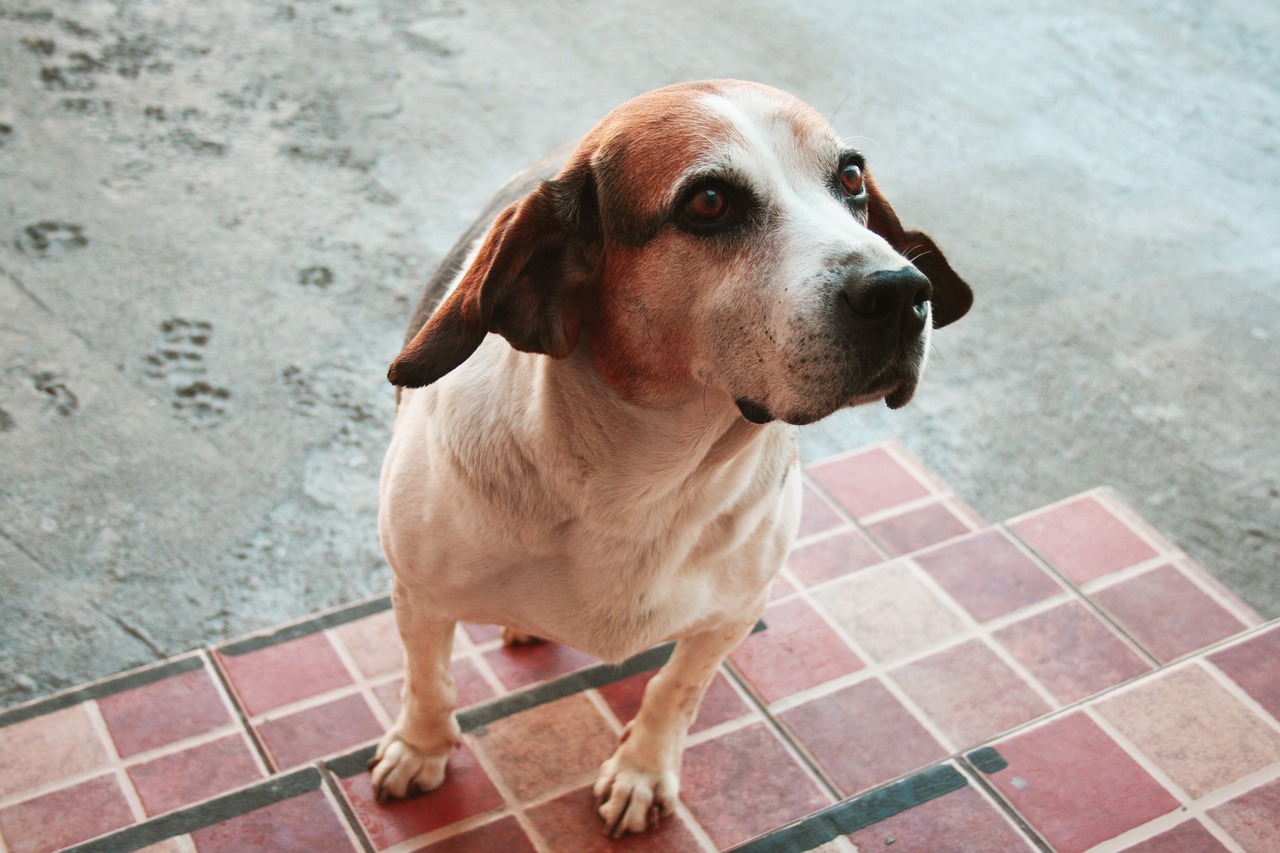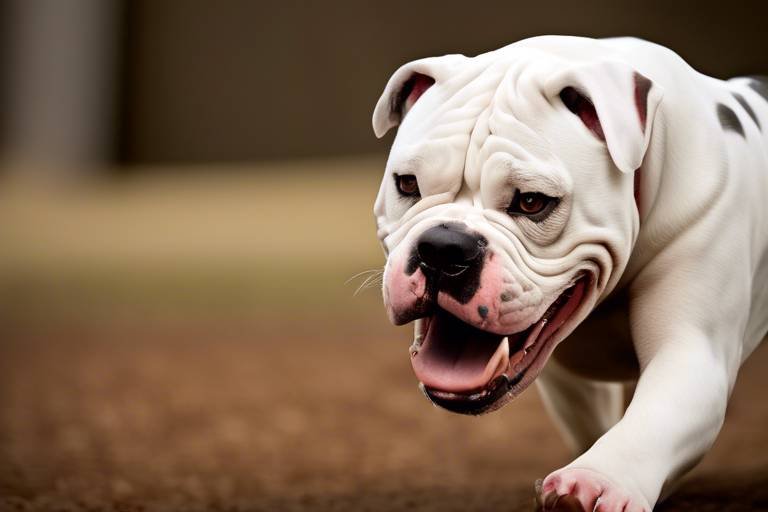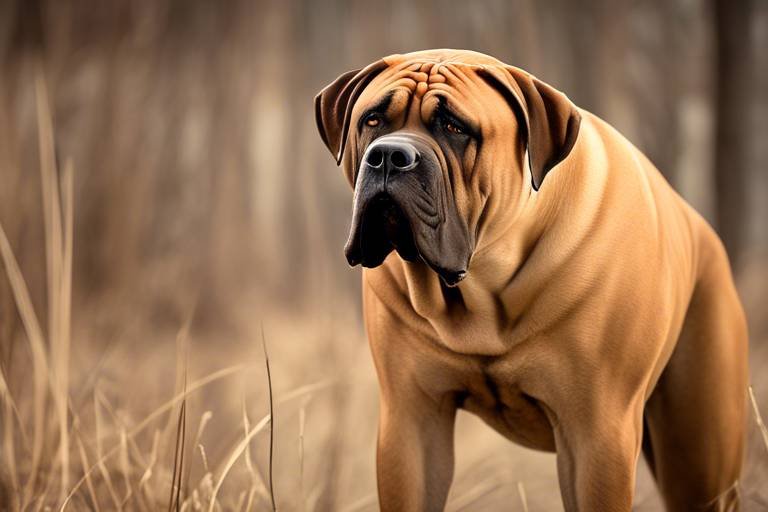Why the Dogo Argentino Is a Great Protector
The Dogo Argentino is not just a dog; it's a formidable guardian with a heart full of loyalty and a body built for strength. When you think of a protector, this breed comes to mind, and for good reason. Originating from Argentina, the Dogo was bred to hunt large game, but its roles have expanded to include being a beloved family member and a vigilant protector. This unique blend of traits makes the Dogo Argentino an exceptional choice for anyone looking for a furry bodyguard.
Imagine having a companion who is not only fiercely loyal but also possesses the physical prowess to deter intruders. The Dogo Argentino stands out with its muscular build, powerful jaws, and unwavering stamina, making it a visual and physical deterrent to those with ill intentions. But it's not just about size and strength; the Dogo Argentino carries a personality that is as impressive as its physique. These dogs are known for their intelligence and trainability, which means that with the right guidance, they can learn to distinguish between a friend and a foe effectively.
Furthermore, the Dogo Argentino's protective instincts are deeply ingrained. They have a natural tendency to watch over their family, making them not just a pet but a true family protector. Their loyalty is unparalleled, often leading them to form strong bonds with family members. This bond fuels their desire to protect, making them attentive guardians who are always on alert. You can almost feel the energy shift in the room when a Dogo Argentino is present; their watchful eyes and alert posture speak volumes about their readiness to defend their loved ones.
In essence, the Dogo Argentino is a breed that embodies the perfect mix of strength, intelligence, and loyalty. Whether you’re looking for a companion to accompany you on your daily adventures or a steadfast guardian for your home, the Dogo Argentino checks all the boxes. With a little training and socialization, these dogs can thrive in family settings while remaining vigilant protectors. It’s no wonder they are held in such high regard as guardians; their innate qualities truly make them one of the best protectors you could hope for.
- Are Dogo Argentinos good with children? Yes, when properly socialized, they are known to be gentle and protective around children.
- How much exercise does a Dogo Argentino need? They require regular exercise to maintain their physical health and mental stimulation.
- Is the Dogo Argentino easy to train? With their intelligence and eagerness to please, they can be trained effectively using positive reinforcement methods.
- Do they require a lot of grooming? Their short coat requires minimal grooming, but regular brushing helps reduce shedding.

Physical Strength and Stamina
The Dogo Argentino is truly a marvel of physical prowess, boasting a robust and muscular build that sets it apart from many other breeds. With a height ranging from 24 to 30 inches and a weight between 80 to 100 pounds, this breed is not just big; it’s built for action. Its strong bones and well-defined muscles allow it to perform physically demanding tasks, making it an excellent choice for those seeking a protective companion. This breed's stamina is equally impressive, as it can maintain high energy levels during long periods of activity. Imagine having a dog that can keep pace with you on a hike, chase after a ball for hours, or even guard your property tirelessly; that’s the Dogo Argentino for you!
One of the standout features of the Dogo Argentino is its ability to combine strength with agility. This breed is not only powerful but also remarkably agile, allowing it to navigate various terrains with ease. Whether it's sprinting across an open field or making quick turns while playing, the Dogo's physical agility complements its strength, making it a formidable protector. This combination of attributes makes the Dogo Argentino highly effective in protective roles, as it can respond swiftly to potential threats.
Moreover, the breed's endurance is a key factor in its protective capabilities. Dogo Argentinos have been known to work tirelessly, whether in the field or at home, showcasing their ability to stay alert and active for extended periods. This stamina is essential, especially in situations where vigilance is crucial. In fact, many owners find that their Dogo Argentino can keep watch over their property for hours without showing signs of fatigue. This relentless energy contributes significantly to their reputation as excellent guardians.
To give you a clearer picture of the Dogo Argentino's physical attributes, here’s a quick overview:
| Attribute | Details |
|---|---|
| Height | 24 to 30 inches |
| Weight | 80 to 100 pounds |
| Muscular Build | Strong bones and well-defined muscles |
| Agility | Highly agile and capable of quick movements |
| Stamina | Can maintain high energy levels for extended periods |
In conclusion, the physical strength and stamina of the Dogo Argentino are not just impressive traits; they are the foundation of its role as a protector. Whether you’re looking for a loyal companion or a vigilant guardian, this breed’s unique physical characteristics ensure that it will rise to the occasion, ready to defend and protect its family with unwavering dedication.
- What is the average lifespan of a Dogo Argentino? The average lifespan is around 10 to 15 years.
- Are Dogo Argentinos good with children? Yes, they are known to be gentle and protective with children when properly socialized.
- How much exercise does a Dogo Argentino need? They require daily exercise, including walks, playtime, and mental stimulation.
- Is the Dogo Argentino an aggressive breed? They are not inherently aggressive but can be protective; early socialization is key.

Intelligence and Trainability
The Dogo Argentino is not just a pretty face; it’s a powerhouse of intelligence and trainability. This breed exhibits a remarkable ability to learn and adapt, making it one of the more trainable dogs out there. Whether you’re teaching basic commands or advanced protection techniques, the Dogo Argentino’s keen mind is up for the challenge. Imagine having a dog that not only understands what you want but also anticipates your needs. That’s the kind of relationship you can build with this breed.
One of the key factors that contribute to the Dogo Argentino’s trainability is its willingness to please. Unlike some breeds that may have a stubborn streak, the Dogo tends to be eager to learn, which makes training sessions enjoyable and productive. However, like any intelligent breed, they require mental stimulation to keep them engaged. A bored Dogo Argentino can become mischievous, so it’s essential to keep things interesting. Incorporating a variety of training techniques can help maintain their focus and enthusiasm.
When it comes to training, consistency is vital. Establishing a routine can help reinforce the lessons you’re teaching. For example, setting aside time each day for training not only helps solidify commands but also strengthens the bond between you and your Dogo Argentino. Here are some effective obedience training techniques that can enhance your training experience:
- Start with Basic Commands: Teaching commands like "sit," "stay," and "come" lays a solid foundation for more advanced training.
- Incorporate Play: Use games and toys as rewards to make training more enjoyable and less of a chore.
- Gradual Progression: Begin with simple tasks and gradually increase the difficulty as your dog masters each command.
Another essential aspect of training a Dogo Argentino is the use of positive reinforcement methods. This technique not only encourages the dog to learn willingly but also builds a trusting relationship between you and your pet. Rather than using harsh corrections, rewarding good behavior with treats, praise, or playtime can lead to a more motivated and happy dog. Think of it as a partnership; the more you invest in training positively, the more your dog will invest in listening to you.
Moreover, early socialization plays a critical role in shaping a Dogo Argentino's temperament. Exposing your dog to different environments, people, and other animals helps it to develop a balanced personality. This exposure allows the Dogo to differentiate between threats and non-threats, which is crucial for its protective instincts. A well-socialized Dogo Argentino is less likely to become overly aggressive or fearful, making it a more reliable protector for your family.
In summary, the Dogo Argentino's intelligence and trainability are significant assets for anyone looking for a loyal companion and protector. By employing effective training techniques and emphasizing socialization, you can unlock the full potential of this remarkable breed. Remember, training is not just about commands; it’s about building a strong, trusting relationship that will last a lifetime.
Q: How long does it take to train a Dogo Argentino?
A: Training duration varies depending on the individual dog and the complexity of the commands being taught. However, with consistent practice, many owners see significant progress within a few weeks.
Q: Can Dogo Argentinos be trained for protection work?
A: Yes, Dogo Argentinos are often used in protection work due to their natural guarding instincts and trainability. Proper training and socialization are essential for them to perform effectively in this role.
Q: Are Dogo Argentinos good with children?
A: When properly socialized, Dogo Argentinos can be excellent family dogs and are generally good with children. Their protective nature makes them devoted guardians, but supervision is always recommended.
Obedience Training Techniques
When it comes to the Dogo Argentino, mastering is not just about teaching commands; it’s about building a strong, trusting relationship between you and your furry protector. This breed is known for its intelligence and eagerness to please, which makes training a rewarding experience. However, it requires consistency and patience. Think of training as a dance: you lead, but your partner needs to follow your steps. If you stumble, it’s okay; just get back in rhythm!
One effective technique is to use positive reinforcement. This method involves rewarding your Dogo Argentino for good behavior, which can be anything from sitting on command to staying calm in a challenging situation. Rewards can be treats, praise, or even a favorite toy. Imagine your dog’s joy when it realizes that sitting quietly earns it a tasty snack! This creates a strong motivation for your dog to repeat the desired behavior. The more positive experiences your dog associates with training, the more eager it will be to learn.
Moreover, establishing a routine can significantly enhance the training process. Dogs thrive on consistency, and having a set schedule for training sessions helps your Dogo Argentino understand what is expected of it. Aim for short, engaging sessions of about 10 to 15 minutes, as this breed can become easily distracted. Incorporate a variety of commands and tricks to keep things interesting. You might start with basic commands like sit, stay, and come, gradually progressing to more complex tasks as your dog becomes more confident.
Another essential aspect of obedience training is socialization. Exposing your Dogo Argentino to different environments, people, and other animals helps it develop a well-rounded temperament. This exposure is crucial for teaching your dog how to react appropriately in various situations, distinguishing between friend and foe. For instance, if your dog encounters a new person, a well-socialized Dogo Argentino will be more likely to remain calm and assess the situation, rather than jumping to conclusions.
Lastly, consider enrolling in a training class. Professional trainers can offer valuable insights and techniques that can enhance your training efforts. Plus, being in a group setting allows your dog to interact with other dogs, which is an excellent way to practice socialization. Remember, training is a journey, not a destination. Celebrate small victories along the way, and don’t hesitate to adjust your approach if something isn’t working. Your Dogo Argentino is not just a pet; it’s a loyal guardian in training!
- What is the best age to start training a Dogo Argentino? It's recommended to start training as early as possible, ideally when they are puppies, around 8 weeks old. Early socialization is crucial.
- How long should training sessions last? Training sessions should be kept short and engaging, typically lasting between 10 to 15 minutes to maintain your dog's attention.
- Can I train my Dogo Argentino at home? Yes, you can train your Dogo Argentino at home, but consider attending professional classes for additional guidance.
- What are some common training mistakes to avoid? Common mistakes include using negative reinforcement, inconsistent commands, and failing to socialize your dog properly.
Positive Reinforcement Methods
When it comes to training a Dogo Argentino, utilizing is not just effective—it’s essential. This breed, known for its intelligence and strong will, responds remarkably well to training that rewards good behavior rather than punishes bad actions. Think of it like teaching a child; would you rather encourage them with praise or scold them for mistakes? The former builds confidence and trust, which is crucial for a Dogo Argentino.
Positive reinforcement involves rewarding your dog with treats, praise, or playtime whenever they exhibit the desired behavior. For example, if your Dogo Argentino follows a command like “sit” or “stay,” showering them with affection and a tasty treat reinforces that behavior. Over time, this method not only helps them learn commands but also strengthens the bond between you and your furry friend. It’s like building a bridge of trust where your dog feels safe and eager to learn.
Moreover, the timing of your rewards is critical. Immediate reinforcement after the desired behavior ensures that your Dogo Argentino associates the action with the reward. For instance, if they bark at an intruder and you immediately praise them for their alertness, they’ll begin to understand that this behavior is commendable and should be repeated. This is where consistency plays a vital role. Using a structured approach to training can help instill a sense of discipline while still keeping the experience enjoyable.
Here are some effective methods of positive reinforcement you can incorporate into your training routine:
- Treats: Use small, healthy treats that your dog loves. This can be anything from commercial dog treats to bits of cooked chicken or vegetables.
- Praise: Verbal affirmations like “Good boy!” or “Well done!” can be incredibly motivating. Your tone should be enthusiastic to convey your excitement.
- Playtime: Incorporating play as a reward can be very effective. If your dog enjoys fetching a ball or tugging on a rope, use these activities as a reward for good behavior.
Additionally, it’s important to remember that every dog is unique. Some Dogo Argentinos may respond better to certain rewards than others. Experimenting with different types of rewards can help you find what works best for your pet. Just like humans, dogs have their preferences, and understanding these can make training more effective and enjoyable.
In conclusion, positive reinforcement not only enhances the learning process for your Dogo Argentino but also fosters a deeper connection between the two of you. By focusing on rewarding good behavior, you’re not just training a protector; you’re nurturing a loyal companion who understands their role in your family. So, grab those treats and get ready to embark on an exciting journey of training with your Dogo Argentino!
Q: How long does it take to train a Dogo Argentino using positive reinforcement?
A: The duration varies based on the individual dog and consistency in training. Generally, with regular practice, you can see significant progress within a few weeks.
Q: Can I use negative reinforcement methods for a Dogo Argentino?
A: It is not recommended. Negative reinforcement can lead to fear and anxiety, which may result in behavioral issues. Positive reinforcement is more effective for this breed.
Q: What if my Dogo Argentino doesn’t respond to treats?
A: If treats don’t motivate your dog, try other forms of rewards such as praise or playtime. Every dog is different, so find what excites your Dogo Argentino the most.
Q: Is socialization important for training a Dogo Argentino?
A: Absolutely! Early socialization helps your Dogo Argentino learn to differentiate between friends and potential threats, enhancing their protective instincts.
Socialization Importance
Socialization is not just a buzzword in the dog training community; it's a critical aspect of raising a well-adjusted Dogo Argentino. Imagine this breed as a powerful guardian, but without proper socialization, it can become overly protective or even aggressive. Early exposure to different people, environments, and other animals helps the Dogo Argentino differentiate between a friend and a foe. Think of it as giving your dog a toolkit to navigate the world safely and confidently.
When you socialize your Dogo Argentino, you’re essentially teaching it the ropes of social interaction. This breed is naturally strong-willed and can be quite dominant, so the earlier you start, the better. Typically, socialization should begin as soon as you bring your puppy home. You can take it to parks, introduce it to various sounds, and even visit pet-friendly stores. The more experiences your dog has, the more adaptable it becomes. It’s like preparing a child for the big, wide world; the more they see, the better they can handle what comes their way!
Moreover, socialization helps prevent behavioral issues down the line. A well-socialized Dogo Argentino is less likely to exhibit fear-based aggression or anxiety in unfamiliar situations. You want a dog that can confidently walk through a crowd or meet new people without feeling threatened. To facilitate this, consider enrolling your puppy in a training class that emphasizes socialization. These classes not only provide a controlled environment for interaction but also offer valuable training tips for you as an owner.
In summary, socialization is paramount for the Dogo Argentino. It ensures that your dog grows up to be a balanced protector, capable of distinguishing between genuine threats and harmless situations. Remember, a well-socialized dog is not just a better pet; it’s a more effective guardian for your family.
- What age should I start socializing my Dogo Argentino? It's best to start socializing your Dogo Argentino as early as 8 weeks old.
- How long should socialization sessions last? Sessions can last anywhere from 15 to 30 minutes, depending on your dog's comfort level.
- Can I socialize my adult Dogo Argentino? Yes, adult dogs can also benefit from socialization, though it may take more time and patience.
- What are some effective socialization activities? Take your dog to parks, arrange playdates with other dogs, and expose it to various environments.
Behavioral Traits
The Dogo Argentino is not just a powerhouse of muscle and strength; it also boasts a unique set of behavioral traits that make it an exceptional protector. Understanding these traits is crucial for anyone considering welcoming this breed into their home. One of the most notable characteristics of the Dogo Argentino is its fearlessness. This breed is naturally inclined to defend its territory and loved ones, often exhibiting a calm yet assertive demeanor when faced with potential threats. Imagine having a guardian that stands tall and composed, ready to protect without hesitation. It’s this blend of strength and calmness that makes the Dogo such a remarkable protector.
Another key behavioral trait is its intelligence. Dogo Argentinos are quick learners, which allows them to adapt to various situations effectively. This intelligence also means they require mental stimulation; otherwise, they may become bored and exhibit undesirable behaviors. Think of it this way: a well-trained Dogo is like a finely tuned instrument, capable of producing beautiful melodies of loyalty and protection when properly guided. Owners should engage their Dogo with challenging activities, such as obedience training or agility courses, to keep their minds sharp and their instincts honed.
Moreover, the Dogo Argentino is known for its strong protective instincts. These instincts are not just about barking at strangers; they manifest in more subtle ways, such as alertness to changes in the environment or unusual noises. This breed has an innate ability to sense when something is amiss, making it an effective watchdog. However, it's important to channel these instincts appropriately through proper training and socialization. Without guidance, a Dogo may react impulsively, which can lead to unnecessary confrontations.
Socialization plays a crucial role in shaping the behavioral traits of a Dogo Argentino. Early exposure to different people, pets, and environments can help the dog distinguish between friend and foe. A well-socialized Dogo is more likely to remain calm and composed in new situations, rather than reacting out of fear or aggression. Owners should aim to expose their Dogo to a variety of experiences during its formative months to foster a balanced temperament.
In addition to these traits, the Dogo Argentino is known for its affectionate nature towards its family. This breed forms strong bonds with its human companions, often seeking to be involved in family activities. This loyalty not only enhances its protective instincts but also makes it a loving and devoted companion. However, it’s essential for owners to establish themselves as the pack leader to ensure that the Dogo respects boundaries while still feeling secure in its role as a protector.
In summary, the behavioral traits of the Dogo Argentino—fearlessness, intelligence, strong protective instincts, and affectionate nature—combine to create a breed that is not just a pet but a true guardian. Understanding and nurturing these traits through training and socialization can lead to a harmonious relationship between the Dogo and its family, ensuring that it fulfills its role as a protector with confidence and love.
- What is the best way to train a Dogo Argentino? Consistent training using positive reinforcement methods works best for this breed.
- How much exercise does a Dogo Argentino need? Daily exercise is essential; aim for at least an hour of physical activity to keep them fit and happy.
- Are Dogo Argentinos good with children? Yes, they can be great family pets, but early socialization is key to ensuring they are well-adjusted.
- How can I help my Dogo Argentino with socialization? Expose your Dogo to various environments, people, and other pets from a young age.

Loyalty and Bonding with Family
The Dogo Argentino is not just a pet; it’s a loyal companion that forms unbreakable bonds with its family members. This breed is renowned for its fierce loyalty, which is a trait deeply embedded in its DNA. Imagine having a guardian who is not only protective but also emotionally connected to you—this is what a Dogo Argentino brings to the table. Their loyalty manifests in various ways, from their watchful gaze to their instinctive reactions when they sense danger. They thrive on the interactions they have with their human family, creating a sense of belonging and security.
Building a strong bond with a Dogo Argentino requires time and dedication. These dogs are highly social creatures that flourish in environments where they feel loved and secure. Engaging in activities such as playing fetch, going for walks, or simply cuddling on the couch can significantly enhance the bond between the dog and its family. It's essential to remember that the more time you invest in nurturing this relationship, the more protective and loyal your Dogo Argentino will become. Their loyalty is not just a trait; it's a reflection of the love and trust they feel towards their human companions.
To further illustrate the importance of loyalty and bonding, consider the following aspects:
- Daily Interaction: Regularly spending time together fosters a deeper connection.
- Training Sessions: Engaging in training not only teaches commands but also strengthens the bond.
- Positive Reinforcement: Rewarding good behavior reinforces trust and loyalty.
Additionally, the loyalty of the Dogo Argentino extends to protecting its family. This breed has an innate sense of duty to safeguard its loved ones, often taking on the role of a vigilant guardian. Whether it's barking at an unfamiliar sound or positioning itself between its family and potential threats, the Dogo Argentino's protective instincts are unwavering. This loyalty is not just about being a watchdog; it’s about forming a protective shield around the family, ensuring that every member feels safe and secure.
Moreover, the dynamics of family life play a crucial role in shaping the Dogo Argentino's protective behavior. For instance, the way family members interact with each other can influence how the dog perceives its role within the household. A harmonious environment where every member is respected and valued will likely lead to a more balanced and protective dog. Conversely, any signs of conflict can confuse the dog, potentially leading to anxiety or misdirected protective behavior.
In summary, the loyalty and bonding of a Dogo Argentino with its family is a beautiful and powerful aspect of this breed. Their unwavering devotion not only enhances the family dynamic but also ensures that they are always ready to protect their loved ones. This unique bond is what makes the Dogo Argentino an exceptional guardian and a cherished family member.
Q1: How can I strengthen my bond with my Dogo Argentino?
A1: Spend quality time together through activities, training, and positive reinforcement to build trust and loyalty.
Q2: Are Dogo Argentinos good with children?
A2: Yes, Dogo Argentinos can be great with children when raised in a loving environment and properly socialized.
Q3: What should I do if my Dogo Argentino shows protective behavior?
A3: Understand the situation, reinforce positive behavior, and ensure proper training and socialization to channel their instincts appropriately.
Protective Instincts
The Dogo Argentino is not just a breed known for its physical prowess; its are among its most remarkable traits. These instincts are deeply ingrained and often manifest in various ways, making the Dogo a natural guardian. Imagine a lion protecting its pride; that’s the essence of the Dogo Argentino when it comes to safeguarding its family. This breed possesses an innate ability to sense danger, often reacting swiftly and decisively to perceived threats.
One of the most fascinating aspects of the Dogo Argentino's protective instincts is its keen awareness of its surroundings. Whether it's a new visitor at the door or unusual noises in the yard, this breed is always alert. Their instincts can be likened to a watchful sentinel, ever ready to defend their territory and loved ones. This vigilance is not just about aggression; it’s about a profound understanding of who belongs and who doesn’t. Dogo Argentinos can distinguish between familiar faces and strangers, which is crucial for effective protection.
Moreover, the Dogo Argentino's protective nature is often coupled with a strong sense of loyalty. This loyalty drives them to take action when they feel their family is threatened. For instance, if they perceive a potential intruder, they may bark to alert their owners and position themselves defensively. This behavior showcases their dedication and willingness to put themselves in harm's way to protect their loved ones. It's essential for owners to recognize and appreciate this instinct, as it can be harnessed positively through training and socialization.
However, it’s crucial to manage these protective instincts properly. Without proper guidance, a Dogo Argentino may become overly protective, leading to unnecessary aggression. Owners should focus on consistent training and socialization from an early age. This process helps the dog learn when to be protective and when to relax. For example, introducing the Dogo to various environments and people can help it understand that not every stranger is a threat. This balance is vital in ensuring that the dog remains a loving family member while also being an effective protector.
In summary, the Dogo Argentino's protective instincts are a blend of natural ability, loyalty, and learned behavior. Understanding and nurturing these instincts can transform a Dogo into not just a pet, but a devoted guardian. As with any breed, the key lies in training and socialization, allowing the Dogo to thrive in its role as a protector while maintaining a harmonious home environment.
- What makes the Dogo Argentino a good protector?
The Dogo Argentino is physically strong, highly alert, and has a natural instinct to guard its family, making it an excellent protector.
- How can I train my Dogo Argentino to enhance its protective instincts?
Consistent training and early socialization are key. Using positive reinforcement methods can help reinforce desirable behaviors.
- Are Dogo Argentinos aggressive?
While they can be protective, they are not inherently aggressive. Proper training and socialization can help them distinguish between threats and non-threats.
- How much exercise does a Dogo Argentino need?
This breed requires regular exercise to maintain its physical health and mental well-being. Daily walks and playtime are essential.
Family Dynamics and Protection
The Dogo Argentino is not just a pet; it’s a family member, a protector, and a loyal companion. Understanding the dynamics of your family is crucial when it comes to maximizing the protective instincts of this breed. These dogs are deeply influenced by the relationships and interactions within the household. They thrive in environments where they can form strong bonds with family members, and this connection fuels their natural instinct to protect. Imagine a fortress where the walls are built from love, trust, and mutual respect—that's the kind of environment the Dogo Argentino flourishes in.
When it comes to family dynamics, the Dogo Argentino is particularly perceptive. It can sense the emotional atmosphere and often reacts to the energy of the home. For instance, if there’s tension or conflict among family members, the Dogo may become more vigilant, sensing that something is amiss. This heightened awareness can be both a blessing and a challenge. On one hand, it makes them excellent guardians; on the other hand, it requires owners to maintain a calm and positive environment. Just like a child who mirrors the emotions of their parents, the Dogo Argentino reflects the emotional state of its household.
Moreover, the breed’s protective nature can manifest differently depending on the family structure. For example, in families with children, the Dogo Argentino often takes on a nurturing role, watching over the little ones with a keen eye. They can be incredibly gentle and playful, but also fierce when it comes to defending their young charges. This duality makes them unique; they can switch from being a playful companion to a formidable protector in an instant. It’s like having a superhero in your home, ready to leap into action when needed.
To truly harness the protective instincts of a Dogo Argentino, it’s essential to establish clear roles and boundaries within the family. This includes:
- Consistent Leadership: The dog needs to know who the leader of the pack is. This helps it feel secure and understand its place within the family hierarchy.
- Shared Responsibilities: Involve all family members in training and care. This not only strengthens the bond but also helps the dog understand that everyone is part of its pack.
- Regular Interaction: Spend quality time together. Activities like walks, playtime, and training sessions reinforce the connection and trust between the Dogo Argentino and its family.
By fostering a healthy family dynamic, you can ensure that your Dogo Argentino remains not just a protector, but also a loving and well-adjusted member of the household. After all, a happy dog is a protective dog, and when they feel secure in their family, they are more likely to act as the fierce guardian you want them to be. The bond you create is the foundation upon which their protective instincts are built, like a sturdy bridge connecting your family’s love to their unwavering loyalty.
Q1: Are Dogo Argentinos good with children?
A1: Yes, Dogo Argentinos are generally good with children. They are protective and can be very gentle, but supervision is always recommended during interactions.
Q2: How much exercise does a Dogo Argentino need?
A2: Dogo Argentinos require a significant amount of exercise, ideally at least 1-2 hours daily. This keeps them healthy and helps manage their energy levels.
Q3: Can Dogo Argentinos be left alone?
A3: While they can be left alone for short periods, Dogo Argentinos thrive on companionship and may become anxious or destructive if left alone for too long.
Q4: How do I train my Dogo Argentino to be protective?
A4: Consistent training and socialization from a young age are key. Positive reinforcement methods work well to encourage desired behaviors while building a strong bond.
Q5: Do Dogo Argentinos require special health care?
A5: Regular veterinary check-ups, a balanced diet, and exercise are essential for maintaining the health of a Dogo Argentino, ensuring they can fulfill their role as protectors.

Health Considerations for Protection
When it comes to the Dogo Argentino, ensuring optimal health is not just a matter of routine care; it's a fundamental aspect of its ability to serve as a protector. These dogs are known for their strength and stamina, but without proper health maintenance, even the most formidable protector can falter. Regular veterinary check-ups are essential to catch any potential health issues early on. Just like a car needs regular oil changes to run smoothly, your Dogo needs consistent health monitoring to keep its protective instincts sharp.
Nutrition plays a pivotal role in maintaining the health of a Dogo Argentino. A balanced diet rich in proteins, vitamins, and minerals is crucial for sustaining its energy levels and overall well-being. Think of it as fueling a high-performance sports car; the better the fuel, the better the performance. Feeding your Dogo high-quality dog food that meets its specific dietary needs will help ensure it remains agile and alert. Additionally, hydration is key, especially during hot weather, as these dogs can be prone to overheating.
Another important aspect of health consideration is exercise. The Dogo Argentino is an active breed that thrives on physical activity. Regular exercise not only keeps them fit but also aids in managing their energy levels, which is vital for a breed that can be quite strong-willed. A lack of exercise can lead to behavioral issues, making it essential to incorporate daily walks, playtime, and even training sessions into their routine. Imagine trying to protect your house with a restless, pent-up dog; it just doesn't work well!
Moreover, grooming should not be overlooked. Regular brushing helps to keep their coat healthy and can reduce the risk of skin problems. It's also a great opportunity to check for any unusual lumps or bumps that could indicate health issues. In addition, dental care is crucial for overall health. Just like humans, dogs can suffer from dental disease, which can lead to more serious health problems if left untreated. Regular teeth brushing and dental check-ups can help keep your Dogo in top shape.
Lastly, understanding the breed's predisposition to certain health conditions is vital for any owner. The Dogo Argentino can be prone to issues such as hip dysplasia and certain heart conditions. Being aware of these potential problems allows you to take preventive measures and seek veterinary advice when necessary. Having a proactive approach to health care will not only enhance your Dogo's quality of life but also ensure that it remains the fierce protector you need.
- What is the lifespan of a Dogo Argentino?
The average lifespan of a Dogo Argentino is around 10 to 12 years, depending on health and care. - How often should I take my Dogo Argentino to the vet?
It's recommended to take your Dogo for regular check-ups at least once a year, or more frequently if any health issues arise. - What type of exercise does a Dogo Argentino need?
This breed requires daily exercise, including walks, playtime, and mental stimulation to keep them happy and healthy. - Are Dogo Argentinos good with children?
Yes, they are known to be loyal and protective of their families, including children, but early socialization is crucial.
Frequently Asked Questions
- What makes the Dogo Argentino a great protector?
The Dogo Argentino is a fantastic protector due to its impressive physical strength, stamina, and unwavering loyalty. This breed is not just muscular but also has a strong instinct to guard its family, making it a reliable guardian in various situations.
- How intelligent is the Dogo Argentino?
This breed is known for its high intelligence, which makes training relatively easy. With the right techniques, such as positive reinforcement, owners can enhance the Dogo Argentino's protective instincts and ensure it responds appropriately to commands.
- What are the best training methods for a Dogo Argentino?
Effective training methods include consistent obedience training and positive reinforcement. These approaches not only help solidify the dog's role as a protector but also foster a strong bond between the dog and its owner, enhancing overall behavior.
- Why is socialization important for a Dogo Argentino?
Early socialization is crucial for the Dogo Argentino to develop a balanced temperament. By exposing the dog to various environments, people, and situations, it learns to differentiate between threats and non-threats, which is essential for its protective nature.
- How does loyalty affect the Dogo Argentino's protective instincts?
The Dogo Argentino's loyalty is a key factor in its protective behavior. This breed forms strong bonds with its family, and this connection drives its instinct to protect loved ones, making it a devoted guardian.
- What health considerations should I keep in mind for my Dogo Argentino?
Maintaining the health of a Dogo Argentino is vital for its role as a protector. Regular veterinary check-ups, a balanced diet, and proper exercise are essential to ensure that the dog remains fit and capable of fulfilling its protective duties.
- How do family dynamics influence a Dogo Argentino's behavior?
The interaction between a Dogo Argentino and its family dynamics plays a significant role in its protective behavior. Understanding these dynamics helps owners manage and channel the dog's instincts effectively while maintaining a harmonious environment at home.



















